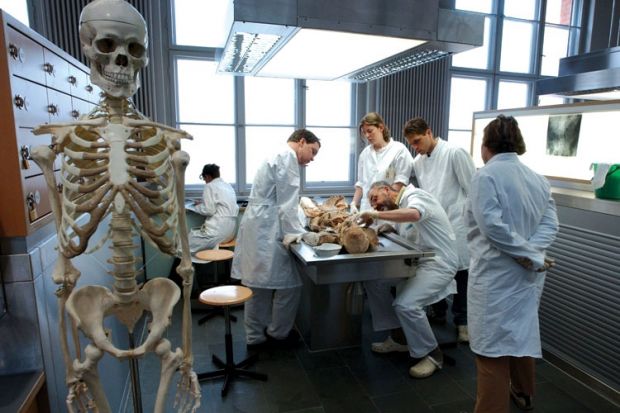Source: PA
Body of evidence: study supports use of UKCAT for medical school entrants
Students with the same entry grades perform better at medical school if they hail from poor-performing schools.
This is one of the conclusions of a study of nearly 5,000 students from 12 UK medical schools published last week in the journal BMC Medicine.
The research, titled The UKCAT-12 Study, finds that the average A-level scores of students’ schools is the only piece of contextual data with significant power to predict performance in medical school.
The finding complements a study by the Higher Education Funding Council for England in 2003, which came up with a similar result for UK universities in general, and the early findings of a follow-up, expected to be published next year.
The UKCAT-12 Study, authored by Chris McManus, professor of psychology and medical education at University College London, and colleagues from UCL and Birkbeck, University of London, says the reason for the phenomenon may be that high-performing schools give pupils’ work “extra polish”that is not available when they leave. Another possibility is the “big fish, little pond effect”, so students from lesser academic environments have higher ambitions.
“That the effect found by [Hefce] is now found in medical students suggests that there is a strong argument for using the contextual measure of average A-level attainment at a secondary school in making admission decisions,” the authors say.
The paper also lends support to the widespread use in medical school admissions of the UK Clinical Aptitude Test (UKCAT), which tests numerical, verbal and abstract reasoning, decision-making and situational judgement. It was introduced in 2006 to help distinguish between high-achieving applicants.
Based on their analysis of students who took the test between 2006 and 2008, the authors conclude that A-level grades remain the strongest predictors of medical school success. But used in conjunction with A-level and GCSE results, the UKCAT offers a small but significant boost to predictability, particularly for mature students, who often have “unusual combinations of academic qualifications”, and female students, who tend to outperform males at medical school but get worse UKCAT scores.
The paper also notes evidence that the test has widened participation and concludes that its use in admissions is “in many ways more justifiable than the use of Ucas personal statements, which…are open to criticism for difficulty in scoring consistently, are subject to a range of influences, including social opportunity, and have not been shown to predict success in medical school”.
Register to continue
Why register?
- Registration is free and only takes a moment
- Once registered, you can read 3 articles a month
- Sign up for our newsletter
Subscribe
Or subscribe for unlimited access to:
- Unlimited access to news, views, insights & reviews
- Digital editions
- Digital access to THE’s university and college rankings analysis
Already registered or a current subscriber? Login




